Searching For The Unknown
Lunatix: The Insanity Circle by Mike Snyder, 1999
Written by Lachie Dazdarian(August, 2005)
Introduction
Lunatix: The Insanity Circle is an excellent "illustrated" text adventure game developed by Mike Snyder. This game is a real QBasic gem and probably the most perfect game for the column.
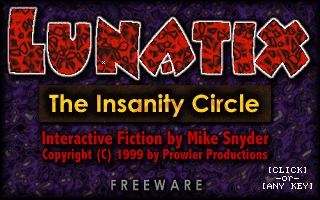
Mike Snyder is a relatively unknown person in the QBasic community if not completely. I cannot know how much this is true since he used to release QBasic games before I joined the community. Still, I never heard anyone mentioning him or any of his games ANYWHERE in the community and just looking at Lunatix: The Insanity Circle makes me wonder why. Maybe I should have checked some of the old QB mags before doing this article to be more sure. Oh, well. Most of his games were released in the period from 1990 till 1997 as shareware(later became freeware) under his shareware label Flogsoli Productions so that was in most part a time before Internet and the QBasic community as we know it. I think that some of his games like Lexter 1 and 2 were quite respected back then(1993) in shareware circles. He also released three other text adventure games(interactive fiction) before Lunatix; Spore, Mystic Force and Breath Pirates. From this, and some things said in the game documentation, we can guess that he was much more interested in interactive fiction than in QBasic. Which is probably another reason for him being so unknown in the community.
Mike's other interests were BBS door games and Lunatix was originally an BBS game. He even earned a nice sum of money on it. According to Breath Pirates readme file he sold around 1000 copies of Lunatix BBS for $15.00(the readme file was written in 1997). It sure was nice to be a shareware developer back then. Lunatix today is a web-based RPG(sad to admit, didn't had time to try it out) and is called Lunatix Online. In this online game you play a role of a mental hospital patient and interact with other players. We could say that Lunatix: The Insanity Circle(the QBasic game) is a by-product of this Mike Synder's decade-long, online project which is still alive.
About Lunatix: The Insanity Circle
Like I said before, Lunatix: The Insanity Circle(L:TIC) is an excellent "illustrated" text adventure game. This "illustrated" means that it features graphical scenes and mouse controllable text boxes(mouse is not required, you can control the boxes with the keyboard too) but it plays like any other text adventure game. Like the designer says, graphical scenes are here to make the play experience more enjoyable. What's cool is that you can play L:TIC it text-only mode by starting the game with LUNATIX /T command-line parameter.
In L:TIC you play the role of Dr. Armund Hammer. After an uneventful day in your asylum you awake for an afternoon nap. 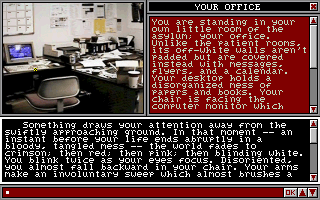 It's time to go home but your keys are missing. This leaves you locked in the asylum. You must find your way out of it.
It's time to go home but your keys are missing. This leaves you locked in the asylum. You must find your way out of it.
The main game screen in L:TIC is very intelligently designed. It's divided in three parts. The main game screen in L:TIC is very intelligently designed. It's divided in three parts. Two boxes are placed in the upper part of the screen. The current scene is displayed in the left box while the description of the current scene is displayed in the right box(you can scroll through it). In the lower part of the screen is the game command prompt(the place where you input your commands) and the message box right above it. The message box is used to display the results of your actions(inputs) and it keeps a pretty large history of your commands and command results through which you can scroll. The choice of colors and the game font is very smart and makes playing the game very comfortable for the eyes.
The very graphic scenes are quite nice. Mike Snyder used a combination of photographs and some original artwork to create the game scenes. While most scenes are cool you will find some lacking, especially the ones that are custom made. The scenes are more incoherent with one another than poor in quality. The game is a bit unbalanced in that part but overall, compared to other QBasic games, the graphics are excellent.
Now the gameplay. Those who are familiar with interactive fiction(IF) know how these games work.
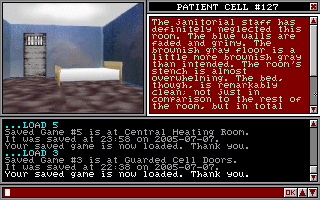 For those who are not a short introduction. Your entire communication with the game is done through the game command prompt, more popularly known as parser. You simply need to type in the action you want for your character to execute. LOOK UNDER TABLE, EXAMINE BOOK, stuff like that. Like in most text adventure games moving around locations is done by typing in the direction where you want to go(for example, NORTH or NORTHEAST). Since Mike Synder is an experienced(or well informed) IF game designer L:TIC supports short substitutes for directions like N for north, U for up, SE for south-east and similar. L:TIC parser also supports X for examine, I for inventory, multiple commands at once, pronouns(for example, "GET BOOK THEN READ IT"), command recall with UNDO, ability to retrieve previously typed commands and few other things that every good IF should have. Not that these things alone make a good IF. What makes a good IF is the parser and the game script. L:TIC parser is simply brilliant. During the entire game I only had a problem on one place with phrasing what I want to do and that was probably a problem with my English vocabulary and imagination and not with the parser. Nothing more to say about the parser but that every newbie in IF game design should check L:TIC or a game with equally excellent parser just to be aware of the standards.
For those who are not a short introduction. Your entire communication with the game is done through the game command prompt, more popularly known as parser. You simply need to type in the action you want for your character to execute. LOOK UNDER TABLE, EXAMINE BOOK, stuff like that. Like in most text adventure games moving around locations is done by typing in the direction where you want to go(for example, NORTH or NORTHEAST). Since Mike Synder is an experienced(or well informed) IF game designer L:TIC supports short substitutes for directions like N for north, U for up, SE for south-east and similar. L:TIC parser also supports X for examine, I for inventory, multiple commands at once, pronouns(for example, "GET BOOK THEN READ IT"), command recall with UNDO, ability to retrieve previously typed commands and few other things that every good IF should have. Not that these things alone make a good IF. What makes a good IF is the parser and the game script. L:TIC parser is simply brilliant. During the entire game I only had a problem on one place with phrasing what I want to do and that was probably a problem with my English vocabulary and imagination and not with the parser. Nothing more to say about the parser but that every newbie in IF game design should check L:TIC or a game with equally excellent parser just to be aware of the standards.
L:TIC is a rather difficult game. I might not be the most suitable person to express such opinion since my experience with IF games is minimal(2 games; :P) but some puzzles really have that "evil" note in them. The game also start with a quite complex and demanding puzzle which can be very discouraging for most of the players. Luckily I happened to have a walkthrough on my hard disk but then it was hard to resist to use it on some easier puzzles. I ended up finishing about 50% of the game by myself. But it was fun to play it even with a walkthrough. The other thing that increases the game difficulty is that you are not sure what is your objective or to be more precise how to accomplish it(leave the asylum). Almost the entire game you(Dr.Hammer) are under the influence of a drug(unknown pill) so for the most of the events in the game you are not sure if they are real or not. This brings me to the game script. L:TIC is a well written game. Mike Snyder sure knows how to write nice, long and often funny description and comments on your actions(inputs). Now the other thing is the plot. I already explained why. Putting the main game character under the influence of an unknown drug is a really convenient way to add illogical and bizarre content/puzzles in your game and that's where lies the only real flaw of L:TIC.
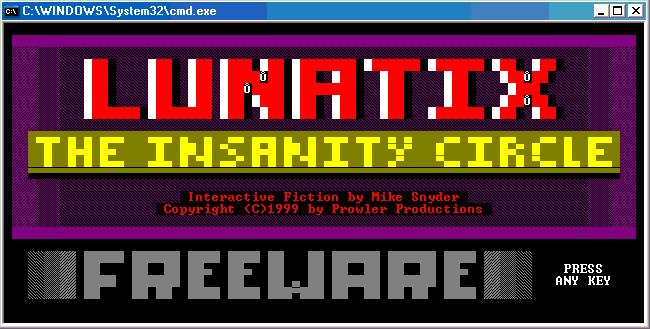
L:TIC features relatively poor sound effects and music. Ok, they are better than PC Speaker blip and blops but not terribly better. Mike Snyder used Tim Truman's(another QB game developer) sound card FM register routines to play the music and sound effects directly from the code. Music plays only during the intro, when you exit the game and when you complete the game and it doesn't sound like something fitting for the game theme. But having in mind how the music is played we should appreciate the effort. "Sound effects" only play when you die, when you undo a move after dying and load or save a game. They are nice and fit in the game theme but since these are the ONLY sound effects in the entire game they leave you thirsty for more. It makes the rest of the game more in need for sound effects than it would without any sound effects implemented at all. In a nutshell, better than nothing which you can't say about PC Speaker sound effects/music in most cases.
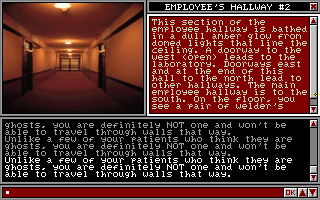
What puts L:TIC above the majority of QBasic games is the fact it's an ILLUSTRATED text adventure game. The graphical interface, the technical perfection of it, the colors, the font and the way the screen is composed makes L:TIC unique, notable and different(in QBasic games world). I don't know if there are any IF purists in the community by they too know that if L:TIC was a classic IF game it would never be properly appreciated in the QBasic community even if Mike took the trouble to promote it. It's just the curse of IF as a genre. No matter in which language an IF game is written it will be played mostly by IF fans and not by fans/users of that specific language. Anyway, you can always choose to play L:TIC in text-only mode but you will miss the real L:TIC then. The graphical interface and the scenes(plus the good script and the parser but not only that) are the reason why L:TIC is a lost part of the QBasic game design history and should be something that anyone with a minimum interest in QBasic games must check. Also, the small number of graphical adventures ever released in QBasic puts L:TIC in the top(if not in the very top) of that genre.
Final score
7.5/10
Get Lunatix: The Insanity Circle
To download the game click here: Lunatix_TIC.zip (L:TIC works in Windows XP just fine without any need for DOS emulators but if you want to hear the sound effects and music you will have to start it with a VDMSound shortcut)
A walkthrough can be acquired by emailing Mike Snyder(the reply email is sent automatically): wyndo@prowler-pro.com
Also, check out the game readme file. It's a very well written and informative document.
For the next issue I will probably "do" MadMix. But I have some other things being considered too. Let's make it a surprise.